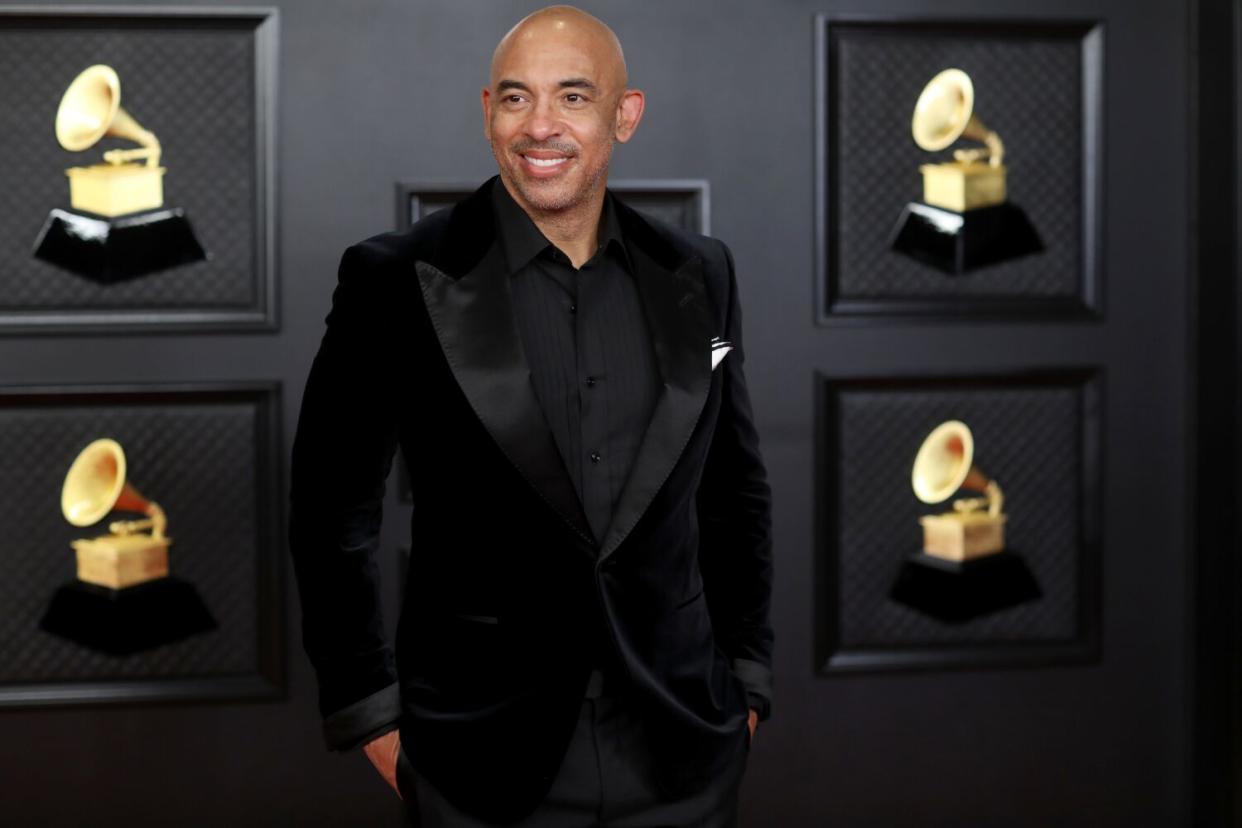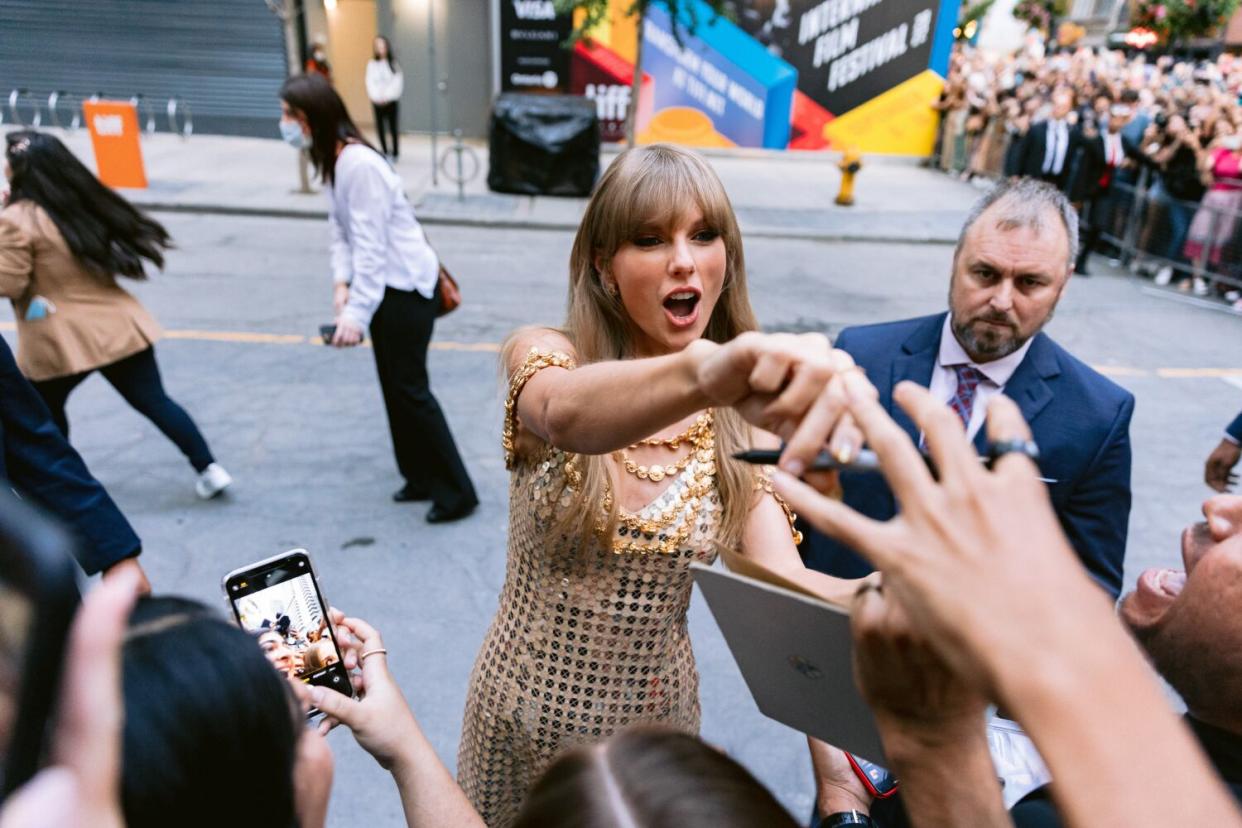As Beyoncé vs. Adele showdown looms, 2023 Grammys could be most star-studded, and fraught, in memory

The nominations for next year’s Grammy Awards are likely to include a number of historic firsts.
Bad Bunny’s blockbuster “Un Verano Sin Ti” is widely expected to become the first Spanish-language LP to score a nod for album of the year. Taylor Swift could become the first artist nominated for that prize twice with the same album — in Swift’s case with her painstaking “Taylor’s Version” expansion of the decade-old “Red.” And should Kendrick Lamar pick up a nod with “Mr. Morale & the Big Steppers,” the Compton native will become the first rapper to compete for album of the year with four consecutive studio LPs.
Yet hovering over the 65th Grammys race — as the yearlong window of eligibility just closed last week and as the start of first-round voting approaches on Oct. 13 — is the prospect of an epic rematch between two veteran superstars: Beyoncé and Adele, both of whom are nearly certain to be tapped for album, record and song of the year — Beyoncé with her dance-floor fantasia “Renaissance” and its Hot 100-topping lead single, “Break My Soul,” and Adele with her ballad-heavy “30” and its No. 1 hit of a lead single, “Easy on Me.”
If that showdown materializes as predicted in nominations due to be announced Nov. 15 — a dream scenario for a telecast struggling, like all awards shows, to attract viewers — the rivalry would precisely echo the 59th Grammys in 2017, when the A-list divas went head to head in the same major categories. You remember what ended up happening back then: After Adele’s “Hello” took the record and song awards over Beyoncé’s “Formation,” the English singer completed her sweep with an album of the year win for “25” — then used her tearful acceptance speech to proclaim that she couldn’t rightfully take the trophy knowing that her victory came at the expense of Beyoncé's “Lemonade.”
“You are our light,” she told Beyoncé, whom she called the “artist of my life.”
Adele wasn’t the only one to question Grammy voters’ decision. Artists, commentators and music-industry insiders interpreted Beyoncé’s loss — which followed the defeat of her self-titled 2013 album by Beck’s “Morning Phase” — as a sure sign that the Recording Academy was out of touch with a pop realm largely fueled by Black creativity.
So you can bet the academy is already nervous about a rerun at next year’s ceremony, set to take place Feb. 5 at the Grammys’ longtime home of Crypto.com Arena in Los Angeles after a pandemic-inspired move to Las Vegas for the 2022 show. Yet another loss for Beyoncé, music’s most intellectually ambitious superstar, would risk cementing the perception that the Grammys just don’t get it, as artists like Drake, the Weeknd and Frank Ocean — all of whom have declined at various points to submit projects for awards consideration — have argued in public.
“It’s kind of now or never,” said one well-connected industry veteran of the academy’s chance to show it properly values the work of Black artists. “They have to get it right.”
For its part, the academy insists it’s taking steps to diversify its membership, which historically has been viewed as a stronghold of older white men. This year nearly 2,000 new members joined the organization, 44% of whom come “from traditionally underrepresented communities,” according to the academy. “And almost 50% are under the age of 40,” added Recording Academy chief executive Harvey Mason Jr., who took over in 2020 following the ouster of Deborah Dugan after the former leader made a series of explosive claims regarding vote-rigging, discrimination and sexual misconduct.
“Those kinds of numbers are exciting to me, and not just because we want to tick some boxes on somebody’s expectations,” Mason told The Times. “But we find that a more diverse membership — a young, relevant, more gender-balanced membership — will come out with results that are more reflective of the excellence in music.”

Last year, in a move it described as part of a commitment to transparency, the academy did away with its so-called nominations review committees — small groups of music-business insiders who oversaw, and sometimes amended, the Grammys ballot after voters made their initial picks. (Many concluded that it was a committee that prevented the Weeknd from getting even a single nod for his smash “After Hours” album in 2021.)
"I think it's too early to tell if that transparency is for real," said a prominent major-label executive, who like others in this story requested anonymity to freely discuss the Grammys. Another exec said doing away with the committees "was a great first step" toward restoring trust in the institution. "It might take a few years to bear out," this person added, "but I'm willing to be patient."
Beyond questions about the voting process, the academy has long privileged certain types of music over others, which means Adele definitely stands a chance of beating Beyoncé again for reasons unrelated to any behind-the-scenes conspiracy. “30” upholds plenty of established Grammy values — it’s hand-played, conventionally structured, rooted in personal storytelling — while “Renaissance” takes a more kaleidoscopic approach to a broader narrative about Black and queer history. The latter is also a full-on immersion into dance music, a genre the Grammys have only tentatively embraced.
Indeed, the ceremony's major categories are shaping up as a kind of wider battle between white singer-songwriter traditionalists and more experimental artists of color. Besides Adele’s and Swift’s LPs, album of the year nominees could include Harry Styles’ “Harry’s House” and “American Heartbreak” by the alt-country troubadour Zach Bryan; besides Beyoncé’s, Lamar’s and Bad Bunny’s, they could include Steve Lacy’s psych-soul “Gemini Rights” and “Motomami” by the Spanish avant-pop explorer Rosalía. (The Weeknd, who vowed to boycott the Grammys in the wake of the “After Hours” kerfuffle, didn’t submit his follow-up, “Dawn FM.” A spokesperson for Drake didn’t respond to a question about whether he submitted his latest, “Honestly, Nevermind.”)
Also in the mix: the chart-topping soundtrack for Disney’s “Encanto,” which would become the first animated-movie soundtrack to be nominated for album of the year since “Beauty and the Beast” in 1993; "Wasteland," an indie-label success story by the arty R&B singer Brent Faiyaz; and durable projects from proven Grammy faves Lizzo, Silk Sonic and Brandi Carlile.
Of "Encanto's" hopes of actually winning the album award — something only four soundtracks have done in Grammys history — one seasoned insider laughed and pointed out, "I could see it being the thing someone votes for to avoid having to choose between Beyoncé and Adele."
In record of the year, which honors performers and producers, “Easy on Me” is likely to be joined on one side by Styles’ “As It Was,” while on the other “Break My Soul” will likely share space with the woozy "Wait for U," by Future, Drake and Tems, and Lacy’s “Bad Habit,” which just hit No. 1 on the Hot 100 as voters are taking up their ballots. Lizzo could score a nod with her disco-funk single “About Damn Time,” as could Post Malone and Doja Cat with their frothy “I Like You (A Happier Song)." "We Don’t Talk About Bruno,” the runaway hit from “Encanto,” stands a strong chance too.
Morgan Wallen, the enormously popular country star who was shut out of nominations for the 2022 Grammys after he was caught on video drunkenly using the N-word, is thought to be a long shot for record of the year with the highly streamed "You Proof," even though the Country Music Assn. recently nominated him for Nashville's highest honor, entertainer of the year, at November's CMA Awards. "That's just Nashville doing what they have to do to get him on their TV show," said a country industry veteran. "I don't know if the Grammys are ready to open themselves up to that."
Song of the year, which goes to songwriters, will as always contain some overlap with the record category, though Bryan is more likely to turn up here with the rootsy “Something in the Orange.” Might Swift be nominated for her 10-minute version of “Red’s” “All Too Well”? The song, featuring lyrics not heard in the original, was a cultural sensation when it dropped late last year, and Swift is garnering Oscar buzz with the short film she directed for its music video. But when asked, the academy declined to tell The Times if the blend of new and old material in “All Too Well” makes it eligible for song or record of the year.

Multiple insiders agreed that Bryan is a lock for a nod in best new artist — and that he could go on to win the award in February. Among his likely competition are fellow singer-songwriters Lauren Spencer-Smith, whose “Fingers Crossed” was a Top 40 radio hit, and Joji, whose piano ballad “Glimpse of Us” dominated Spotify; the witty English indie-rock duo Wet Leg; rapper Latto; R&B singer Muni Long; and the breakout Brazilian pop star Anitta.
Each of these categories — the Grammys' so-called Big Four — expanded to 10 nominees from eight for the first time at this past April's 64th ceremony, where Jon Batiste's "We Are" won album of the year, Olivia Rodrigo was named best new artist and Silk Sonic's "Leave the Door Open" took both record and song of the year. Some in the business have complained that doling out so many nods dilutes the prestige of being nominated, criticism that Mason dismissed. "Having more great music made by more great people for us to celebrate is a win," the academy boss said. "I don't see a downside to it."
Mason did acknowledge that the experience of voting, as many have complained, is too cumbersome, particularly for academy members who do everything on their phones. "It's not as frictionless as I'd like it to be," he said, adding that the academy has been working on "big changes" to its digital voting platform. Still, Mason insisted that voting "is not meant to be a process that you finish in minutes. We're assessing and evaluating people's art. That's gonna take a little bit of time."
As for the Grammys show itself, Mason said that while he enjoyed the one-off in Vegas — "great destination-wedding vibes," he said — he's excited to bring the ceremony back to L.A. for a telecast to be overseen for the third year in a row by TV producer Ben Winston's Fulwell 73 production company. Trevor Noah served as host in 2021 and 2022. The academy hasn't said yet who will host in February.
This story originally appeared in Los Angeles Times.
